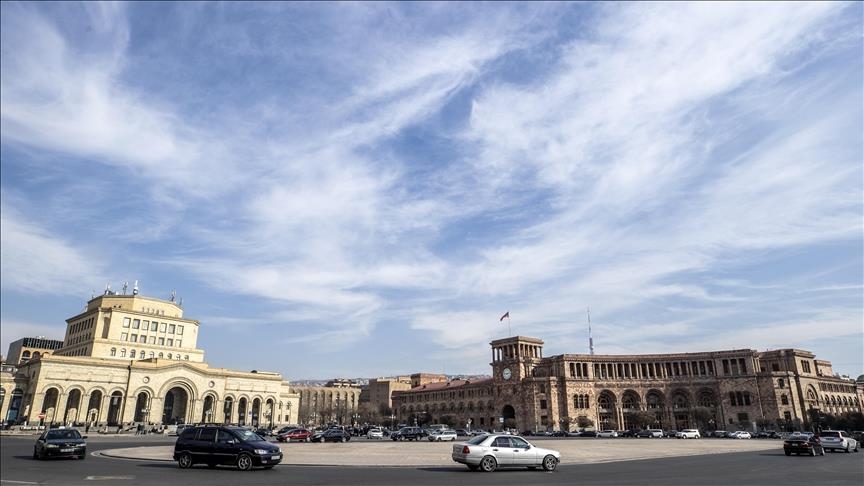EXPLAINER - What does Armenia's suspension of its participation in CSTO mean?
Armenia's premier announced Thursday that it had frozen its participation with the CSTO, a Russian-led regional military bloc with 5 other post-Soviet countries

- Months of deteriorating relations between Armenia and the alliance of more than 2 decades appear to have come to a head amid Yerevan's growing ties with Western nations, particularly France
ISTANBUL
Armenia's Prime Minister Nikol Pashinyan set off a diplomatic flurry on Thursday when he said his country had "suspended" its participation in the Collective Security Treaty Organization (CSTO).
Pashinyan had told broadcaster France24 that the CSTO, a Russian-led regional military bloc with five other post-Soviet countries, had failed to fulfill its objectives "as far as Armenia is concerned, particularly in 2021 and 2022."
His remarks came after an official visit to Paris, where he held talks with French President Emmanuel Macron and agreed to further improve bilateral ties in transportation, energy, water, and defense.
But hours after Pashinyan's remarks, the Kremlin maintains that Yerevan had sent no official notification to the CSTO of its intentions to suspend its membership.
What is the CSTO?
The CSTO consists of Russia, Armenia, Belarus, Kazakhstan, Kyrgyzstan and Tajikistan and was established in its current format as a regional military alliance on Oct. 7, 2002.
But its origins date back a decade earlier, when the leaders of Armenia, Kazakhstan, Kyrgyzstan, Russia, Tajikistan and Uzbekistan signed the Collective Security Treaty in the Uzbek capital of Tashkent on May 15, 1992.
Azerbaijan, Belarus, and Georgia joined the treaty a year later, though it entered into force in 1994.
The Collective Security Treaty entered into force for a five-year period as a regional agreement until 1999, after which all but Azerbaijan, Georgia, and Uzbekistan renewed their membership.
The military bloc assumed its current format three years later after a decision at a summit of the Commonwealth of Independent States in the Moldovan capital Chisinau to approve the CSTO Charter.
According to Article 4 of the charter, an "aggression" by any "state or group of states" against any one of the organization's members will be considered as an "aggression" against all parties to the military alliance.
The article requires all CSTO countries to assist an attacked member nation, including with military support, "at their disposal in exercising the right to collective defense in accordance with Article 51 of the UN Charter."
Why is Armenia suspending participation?
Since late 2022, Armenia has significantly downgraded its relations with the CSTO. They further deteriorated after Yerevan announced in January last year that it would not host drills in 2023 due to "the current situation in the country's territory."
Armenia later announced in March that it had informed the CSTO of its refusal to use its quota to appoint a deputy secretary-general in the alliance.
Pashinyan has voiced criticism of the CSTO for not supporting Armenia during clashes in Azerbaijan's Karabakh region in May 2021 and September 2022.
Relations between Azerbaijan and Armenia have been tense since 1991, when the Armenian military occupied Nagorno-Karabakh, a territory internationally recognized as part of Azerbaijan, and seven adjacent regions.
Azerbaijan liberated most of the region during a war in the fall of 2020, which ended with a Russian-brokered peace agreement, opening the door to normalization.
In May 22, 2023, Armenia’s premier also voiced that he did not rule out the possibility of Yerevan withdrawing from the CSTO if the alliance becomes "inactive."
"If Armenia de jure decides to withdraw from the CSTO, this will happen after Armenia records that the CSTO has left Armenia. Such an agenda exists if the CSTO becomes an inactive organization. Then, we will have to decide our own security issues," he said.
What comes next for Armenia?
Despite statements from the CSTO Secretariat and Russia that Armenia has not officially notified the bloc of its decision to suspend its membership, Yerevan has shown a drift towards other security arrangements in recent months.
Elaborating on Armenia's decision not to participate in recent CSTO summits, Pashinyan told lawmakers in November that the alliance was not sensitive enough to his country's security issues and that his government was "looking for other security partners."
"We are searching (for other partners), and we are finding them. We are trying to sign contracts and acquire weapons and military equipment," Pashinyan said.
He went on to note that Yerevan has not decided to withdraw from the CSTO and that no announcements on a change in this policy was imminent.
CSTO Secretary-General Imangali Tasmagambetov also denied that there had been talks on Armenia's withdrawal, adding that Yerevan's work in the organization continued.
Meanwhile, Russia urged Armenia to stop publicly criticizing the bloc and "start discussing urgent issues at the political and expert levels."
Throughout this time, however, Armenia has stepped up diplomatic contacts with Western nations, most notably France, with which it has signed a new cooperation agreement in a visit by Defense Minister Sebastien Lecornu to Yerevan that began late Thursday.
Anadolu Agency website contains only a portion of the news stories offered to subscribers in the AA News Broadcasting System (HAS), and in summarized form. Please contact us for subscription options.







